Resources
12 May 2024
10:30am
What is the Spirit's main work?
Please have a seat. One occupational hazard of my role is that people just checking our church out sometimes give their opinion on the door. So a while back, one newcomer said to me ‘I can see this church takes the Bible seriously. But I wonder if it’s really Spirit-filled.’ And I got the impression he thought…probably not. But how can you tell? Is a church Spirit-filled because it talks a lot about the Spirit? Is a church Spirit-filled because it’s very emotional? Is a church Spirit-filled because unusual things are happening? Is a church Spirit-filled because it’s got a great sound system? How can you tell that God’s Spirit is it work? And: What is the Spirit’s main work? Well in this last part of this series on the Holy Spirit, Jesus’ answer is this (John 16.14):
He [that is the Spirit] will glorify me
So let me lead us in prayer before we go on:
Lord Jesus,Help us to understand what it means that the Holy Spirit’s main work is to glorify you, and please may he do that work among us today. In your name, Amen
This morning’s Bible passage will be up on the screen, but it’s on page 902 of the Bibles in the seats, and I’d encourage you to turn to that – where you’ll find John 16. And this is part of John’s record of what Jesus taught his apostles on the Thursday night before Good Friday. So just look down to John 16.12, where Jesus said:
I still have many things to say to you, but you cannot bear them now.
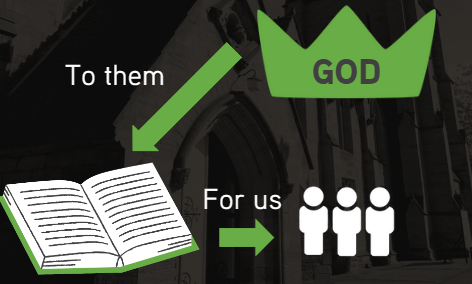
Now one thing we’ve seen in this series is that the words spoken and written in the Bible were not spoken and written directly to us – but to others, for us. So it’s a mistake for us to read something like (John 16.12) I still have many things to say to you as if the you meant me and you. Because in John 16.12, the you are the apostles, listening to Jesus on the night before he died. And Jesus said to them:
I still have many things to say to you, but you cannot bear them now.
Which sounds strange doesn’t it? Because Jesus had only hours with them before his arrest, trial and death on the cross. And yet he was clearly planning to teach them much, much more. Only he says that, at this point, they couldn’t bear it – in other words, couldn’t understand it. And that reminds us of what we saw earlier in this series. Which is that the apostles couldn’t understand Jesus until after his death and resurrection because only afterwards would they be able to see that his resurrection showed he really was God the Son; and that his death wasn’t a tragedy but a rescue – as he paid for the forgiveness of our sin on the cross. So that was John 16.12 to them, then. But what does it say to us, today? Well, here’s lesson 1:
1. If you try to understand Jesus without his death and resurrection, you’ll always misunderstand him
So the apostles had been trying to understand Jesus without his death and resurrection – because they hadn’t happened yet. So no wonder they hadn’t understood him yet.
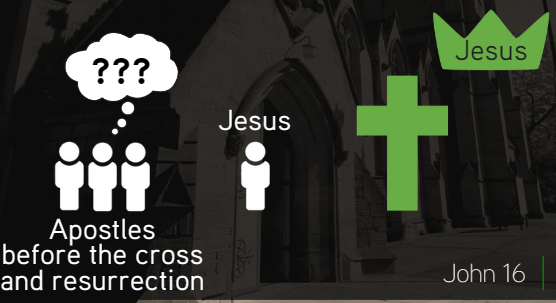
But today, you still find people trying to understand Jesus without his death and resurrection. For example, liberal teachers in the church.
They find the thought of Jesus dying for our sins offensive, and his resurrection unbelievable. So they cross out his death and resurrection in their thinking, and try to understand Jesus only from his life.
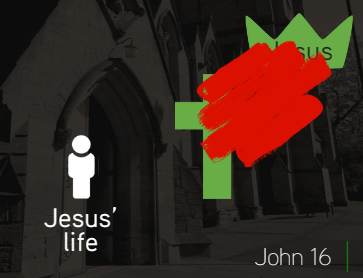
And because one thing Jesus did in his life was to teach, one classic thing they say is that ‘Jesus was a great moral teacher’. (Although that ignores the fact that great moral teachers don’t go round claiming to be God, like Jesus did.) And because another thing Jesus did in his life was to heal and help people, another classic thing they say is that ‘Jesus was a great example of caring for the sick and the poor.’ (Although that ignores the fact that Jesus said sickness and poverty aren’t the biggest problem, but facing God’s judgement unforgiven is). But if you try to understand Jesus without his death and resurrection, you’ll always misunderstand him because to think he was just a great teacher or just a great example is to misunderstand him completely. As someone put it:
If our greatest need had been health, God would have sent us a doctor.If our greatest need had been wealth, God would have sent us an economist.If our greatest need had been education, God would have sent us a teacher.But our greatest need is that we’re sinners facing God’s judgement.So he sent us a Saviour.
Look back to John 16.12-13 again. Jesus said to his apostles:
I still have many things to say to you, but you cannot bear them now. [But] When the Spirit of truth comes, he will guide you into all the truth.
Now I’ve read books and heard talks where that’s been ripped out of context, and the writer or speaker has said that’s about the Holy Spirit guiding Christians in the decisions they face in life. So for example, you’re going out with someone and the Spirit somehow says to you, ‘She’s the one.’ Or you’re in an interview and the Spirit somehow says to you, ‘Don’t touch it with a barge pole.’ But remember: the words spoken and written in the Bible were not spoken and written directly to us – but to others, for us. And in John 16.13, Jesus was promising his apostles that:
When the Spirit of truth comes, he will guide you into all the truth.
So here’s lesson 2:
2. The Spirit guided the apostles to understand Jesus rightly – once and for all, and for us
Now back in John 14.6-7, Jesus had just said to them:
I am…the truth…If you had known me, you would have known my Father also. From now on you do know him and have seen him.
In other words, ‘I am the truth of God. If you’ve seen me, you’ve seen God. All the answers about God are here in me.’ And then, John 16.13 again, he said to them:
When the Spirit of truth comes, he will guide you into all the truth.
Which means, ‘He will guide you into all the truth that you’ve seen and heard in me – but can’t yet understand.’ That’s what Jesus promised the Holy Spirit would do for the apostles, after his death and resurrection. So Jesus wasn’t saying that the Holy Spirit would guide them (let alone us) into additional truth or new or different truth. He was saying that the Holy Spirit would guide them to understand the complete and final truth from God that they’d already had in Jesus.

So it’s like a bud opening out into a flower. Everything is there already in the bud. And the flower is simply everything that was in the bud, but fully opened out. So all the truth about God was there already, ‘in the bud’ in Jesus. And the Holy Spirit was going to open that all out to the apostles,
and give them the understanding of Jesus which they’ve left, once and for all and for us, in the New Testament. So we need to beware of those who say that Jesus wasn’t the complete and final truth from God – but that we need additional truth. So that’s what a Mormon would say. ‘It’s good that you know about Jesus in the Bible. But actually the Bible’s been corrupted and what you really need to know God is the book of Mormon.’ Additional truth. And that’s what a Muslim would say. ‘It’s good that you know about Jesus – he’s a prophet we respect. But actually God’s complete and final revelation was to Muhammud in the Qu’ran.’ Additional truth.
But we also need to beware of those who say the Holy Spirit is guiding the church into new or different truth. Which is what the leaders of the Church of England are saying, as they seek to introduce the blessing of same sex relationships. They wrote this about the process of coming to that decision:
Above all, we have sought the wisdom of the Holy Spirit…We…seek to be a church that embodies…an inclusion that is founded in scripture, in reason, in tradition, in theology and the Christian faith as the Church of England has received it – based…in a proper 21st century understanding of being human and of being sexual.[Living In Love & Faith: A response from the Bishops of the Church of England about identity, sexuality, relationships and marriage]
So they claim that the Holy Spirit has guided this process – that it’s an example of John 16.13 happening today. Whereas, in fact, John 16.13 was a promise to the apostles. And John 16.13 was a promise that the Spirit would open up to them only what was already there ‘in the bud’ – so that he wouldn’t guide them into new or different truth that contradicted Jesus. But if you look at Jesus’ teaching on the creation of the sexes and the nature of marriage, the process in the Church of England quite clearly contradicts him. By contrast, Jesus said the understanding that the Spirit would guide the apostles into would be in full continuity with him. Look back to John 16.12-13 again. Jesus said to the apostles:
I still have many things to say to you, but you cannot bear them now. [So the implication is that Jesus will teach them more, but after his death and resurrection, and through the Holy Spirit – who, after all, is his Spirit] When the Spirit of truth comes, he will guide you into all the truth, for he will not speak on his own authority, but whatever he hears [which I think must mean ‘hears from the risen Jesus’] he will speak.
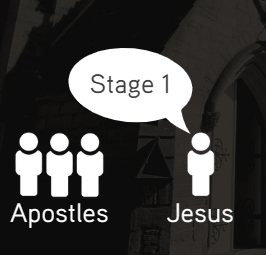
So Stage 1 was what Jesus taught the apostles when he was here, bodily on earth. Stage 2 was then the further understanding that Jesus guided them into, after his death and resurrection, through his Spirit. And Jesus doesn’t contradict himself. There’s continuity from stage 1 to stage 2.
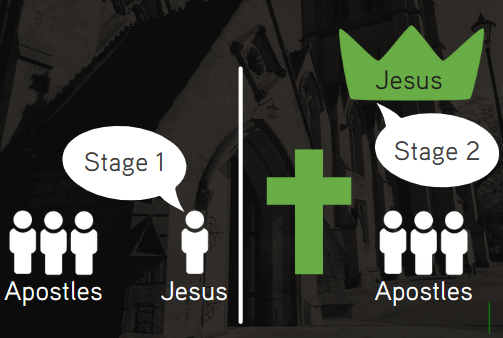
Then just look at the end of John 16.13, which I missed off:
…and he [the Holy Spirit] will declare to you the things that are to come.
So remember: Jesus was speaking the Thursday night before Good Friday and then Easter Sunday. So the things that are to come must be, first and foremost, Jesus’ death and resurrection. And Jesus was saying: after they’d happened, through his Spirit, he’d help them understand why he had to die, and what his resurrection really said about him. But the things that are to come are not just Jesus’ death and resurrection, but everything they triggered. Because they triggered the job of getting the news of Jesus out to people from every nation. They triggered the coming of the Holy Spirit to bring people from every nation to faith in Jesus. They triggered the birth of the world-wide church, and its job of showing the world (albeit imperfectly) how different and how good life is under Jesus’ Lordship. And they triggered the countdown to Jesus’ return, to wrap up history and, as the creed says, to judge the living and the dead. And everything I’ve just mentioned is opened out for us in the New Testament – which is the once and for all written fulfilment of these promises to the apostles. So that’s lesson 2: The Spirit guided the apostles to understand Jesus rightly, once and for all and for us. And lesson 3 is just a different way of saying the same thing, because lesson 3 is that:
3. The Spirit’s main work is to glorify Jesus
Look on to John 16.14, where Jesus said to his apostles:
He [the Holy Spirit] will glorify me
Now that’s not immediately clear, is it? I guess we have some idea that to glorify a person is to treat them as important because of their position or achievements. But what exactly does it mean? Well, read on and Jesus explains (John 16.14-15):
He will glorify me, for he will take what is mine and declare it to you. All that the Father has is mine; therefore I said that he will take what is mine and declare it to you.
So remember: Jesus was looking ahead to after his death, resurrection and return to heaven – or, as he puts it in John 17, to his return to glory. And if we could somehow see into heaven right now, we’d see the risen Jesus in his glory as God the Son. And his glory includes the fact that, through his death on the cross, his Father has given him the – authority to forgive every sin of any person who comes to him. And his glory includes the fact that, through his resurrection, he’s now – ruling the universe with his Father. And his glory includes the fact that his Father has given him – the job of finally wrapping up history, and judging the living and the dead. That’s what Jesus meant when he said, John 16.15:
All that the Father has is mine.
He meant that through his death and resurrection and return to heaven, all his Father’s rights as God (his authority to forgive and rule and judge) would be given to him. And that’s now happened, so John 16.14 can now happen:
He [the Holy Spirit] will glorify me
Which means that the Holy Spirit will give the apostles first of all, but then countless people after them, the spiritual eyes to see Jesus’s glory, to realise that Jesus is risen, that he’s God, and that he has the authority to forgive and rule and judge. And someone has helpfully called it the Spirit’s ‘floodlight ministry’. So just think of the Millenium Bridge. I’ve walked along the Quayside at night when the bridge’s lights have been off, and you wouldn’t even have known it was there. And then suddenly on they went, and not only did you know it was there but you thought ‘What a great bridge’ and you’re drawn to it. And the Spirit’s main work, as we hear about Jesus in the Bible for the first time or the umpteenth time, is to ‘light up’ Jesus to our spiritual eyes – so that we see, we realise, that he really is there, and really can forgive us, and really does love us, and really is ruling over the events in our lives – so that we’re drawn to him. Or in other words, the Spirit’s main work is simply to create and sustain in us faith in Jesus, as we hear about Jesus in the Bible.
Now I’ve just crossed the line from saying that He will glorify me applied to the apostles, to saying that it applies to us today. And that’s because the apostles said that it’s the same work of the Spirit that finally brought them to faith in Jesus that brings anyone to faith in Jesus. For example, here’s what the apostle Paul said about himself and the people who came to faith through his witness (2 Corinthians 4.6):
For God, who said, “Let light shine out of darkness”, has shone in our hearts to give the light of the knowledge of the glory of God in the face of Jesus Christ.
It’s the same ‘floodlight ministry’ – to the apostles then to us. So going back to my newcomer at the start, who wondered whether this church was Spirit-filled. John 16 says that if a church is faithfully talking about the Jesus of the Bible, and people are coming to faith and growing in faith, then the Holy Spirit is certainly at work. Or here’s another illustration. A good friend of ours used to work in theatre (including the Theatre Royal here) in lighting, as lead spot. And lead spot means you have a hefty spotlight over your shoulder, and you light up the leading player wherever he or she goes on stage. And our friend has done that for the RSC – and probably for some household name actors like Mark Rylance in Hamlet. But no-one’s ever heard of her because the whole point of lead spot is to light up the leading player. And our friend would never have wanted the audience to turn round and look at her. And Jesus is saying here that the Holy Spirit is ‘lead spot’ for him. Jesus says ‘He will glorify me. He wants to light me up, he wants to create in peoples’ hearts understanding of me, and faith in me. And he doesn’t want people to turn round and look at him.’
So, going back to one of my questions at the start, is a church Spirit-filled because it talks a lot about the Spirit? I think the answer is no. I think the answer is: the Spirit wants us to be talking a lot about Jesus, so that he can light up Jesus and and create understanding of him and faith in him. Of course we need to know about the Spirit – which is why we’ve had this sermon series, and why we’re going on next to a series in Acts 1-4 to see how Jesus’ promises about the Holy Spirit began to be fulfilled. But the Spirit himself would say don’t focus on me because I want your focus to be on Jesus. So going back finally to my other questions at the start: Is a church Spirit-filled because it’s very emotional? The answer is that the certain sign of the Spirit at work is people coming to faith in Jesus and growing in faith in Jesus. And yes, that involves all sorts of emotions from grief over sin to joy over forgiveness. But some of us are more emotional and some of us are less, and we need to be careful about saying how much emotion or which emotion is the certain sign of the Spirit at work.
And then my other question at the start was: Is a church Spirit-filled because unusual things are happening – for example, people speaking in tongues or falling to the floor? Well again, the answer is that the certain sign of the Spirit at work is people coming to faith in Jesus and growing in faith in Jesus – and, you could add, being united and committed to one another as a church family who would never otherwise have crossed tracks apart from having Jesus in common. And given the state of the human heart, for those things to happen is not just unusual, but impossible. So where they are happening, you can be certain the Spirit is at work.
